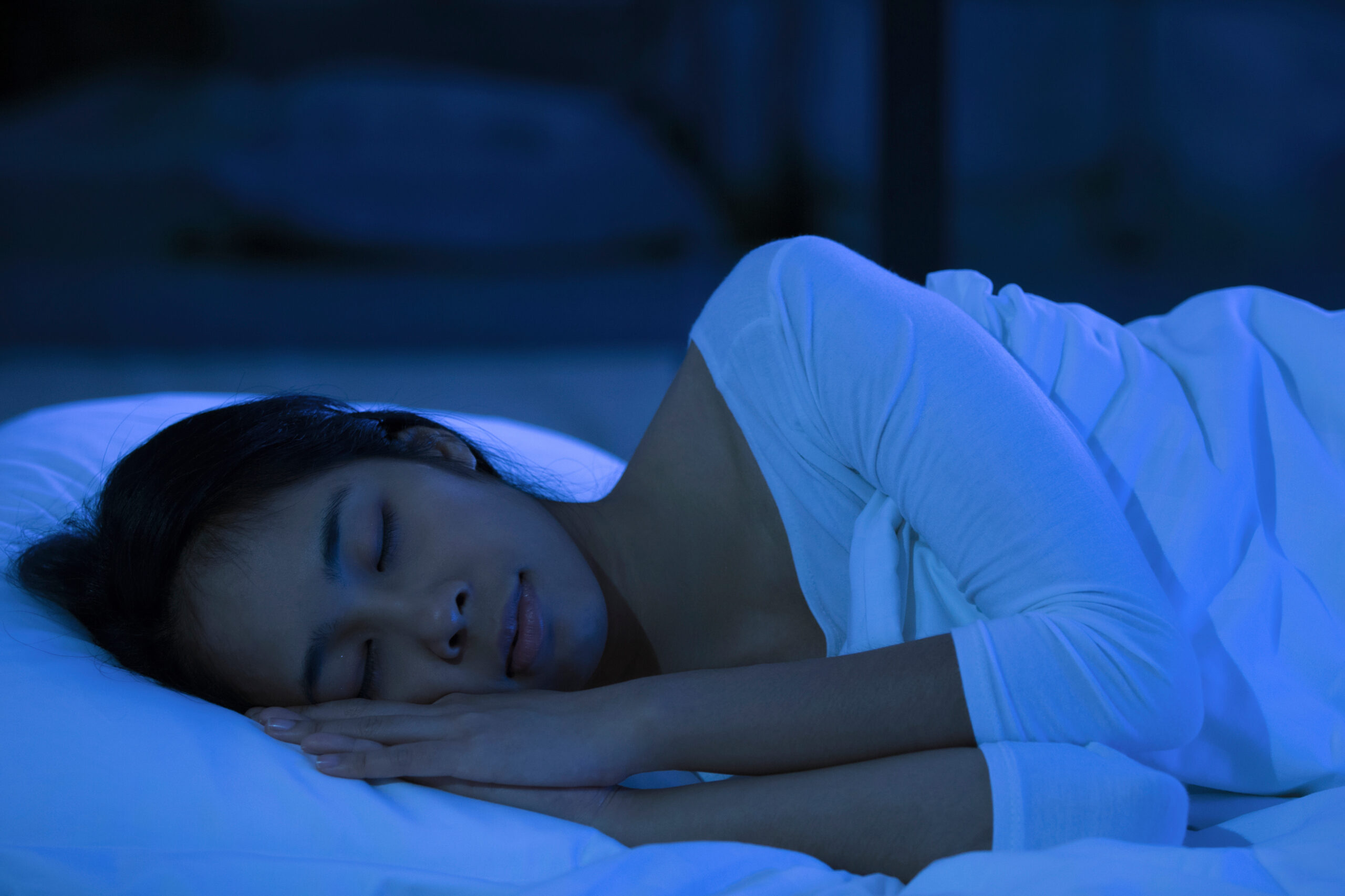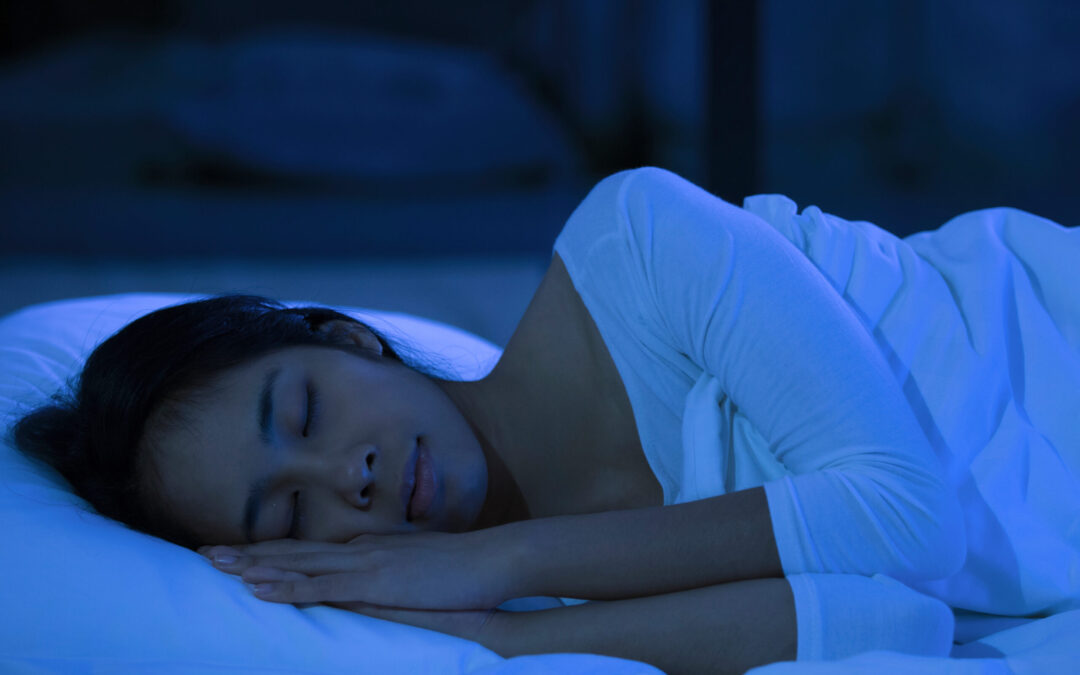
PhotoCredit_torwaiphoto_AdobeStock
Passionflower extract has many health benefits, including help with feelings of anxiety and improving the quality of sleep. Let’s break down passionflower’s benefits, side effects, and how effective it can be in combination with other ingredients for sleep.
Passionflower Extract Overview
Passionflower extract is valued for its calming properties and stress-relief potential. Derived from various parts of the Passiflora plant, it holds a prominent place in herbal medicine.
- Derived from Passiflora incarnata: Passionflower extract is obtained from the Passiflora incarnata plant.
- Calming and Sedative Properties: Known for its ability to alleviate anxiety, improve sleep quality, and manage nervousness and stress.
- Active Compounds: Contains flavonoids and alkaloids that interact with the GABA system in the brain, promoting relaxation.
- Clinical Benefits: Effective in reducing anxiety, improving sleep patterns, and enhancing overall quality of life.
- Additional Uses: Explored for managing pain, menopausal symptoms, and heart rhythm issues.
- Safety: Generally considered safe but should be used under healthcare provider guidance to avoid interactions and ensure proper dosing.
Passionflower Supplements
The supplement form of passionflower is popular for its soothing effects. Many take it to promote relaxation and ease anxiety. Passionflower’s active ingredients are believed to interact with the nervous system, potentially improving overall mood and relieving tension.
This extract is available in various forms, including liquid tinctures, capsules, and teas. It is crucial to adhere to dosage recommendations, as excessive consumption may lead to side effects.
Botanical Profile
Passionflower, scientifically known as Passiflora incarnata, is a climbing vine native to the southeastern United States and some tropical regions. It features striking flowers with a complex structure and vibrant colors.
The plant’s aerial parts—leaves, flowers, and stems—are primarily used to produce the extract. Recognized for its mild sedative properties, it has been traditionally utilized in herbal remedies. The organic cultivation of passionflower ensures high-quality extract production.
Passionflower Benefits
Passionflower extract offers a range of health benefits, particularly in the areas of improving sleep quality, reducing anxiety, and providing pain relief. It works through various mechanisms, enhancing the levels of certain chemicals in the brain that promote relaxation and calmness.
Sleep Improvement
Passionflower is often used to enhance sleep quality. It has been shown to potentially improve sleep by increasing gamma-aminobutyric acid (GABA) levels in the brain. GABA helps reduce brain activity, leading to relaxation and improved sleep.
Research supports the use of passionflower for individuals with insomnia. A clinical trial highlighted significantly improved sleep using a natural formulation containing passionflower. The herb’s sedative properties make it a popular choice among those seeking natural remedies for sleep problems.
Passionflower and Anxiety
The calming effects of passionflower have long been utilized to manage anxiety. By increasing GABA levels, passionflower exerts a calming effect on the brain, reducing feelings of nervousness and tension.
Studies have shown that passionflower supplementation can effectively decrease anxiety symptoms. Whether used alone or alongside other treatment modalities, it offers a natural option for those dealing with chronic anxiety. This has made it a staple in herbal medicine practice for stress management.
Pain Relief
Passionflower may also provide relief from certain types of pain. While primarily recognized for its calming effects, the herb can contribute to pain management by supporting relaxation and stress reduction, which can indirectly lessen pain perception.
Its analgesic properties may complement other pain relief strategies, making it a potentially valuable component of a holistic approach to pain management. More research is needed to fully establish its efficacy, but it remains a promising natural option for some individuals.
Anxiolytic Effects
Passionflower’s anxiolytic effects are well-documented. It functions as a natural sedative, potentially reducing anxiety without the side effects often associated with prescription medications. The herb is used for mild to moderate anxiety cases, offering a gentle approach compared to more traditional anxiolytics.
Clinical findings reinforce the efficacy of passionflower in stress and anxiety reduction, as detailed in product trials. Its use is increasingly being explored as a treatment for anxiety-related disorders, providing a viable alternative for those seeking natural solutions.
Passionflower for Sleep
Passionflower is recognized for its potential to alleviate anxiety and insomnia by increasing levels of gamma aminobutyric acid, which may lead to improved sleep quality. This section explores its implications in two specific contexts.
Benefits of Passionflower Extract for Sleep and Anxiety:
- Reduces Anxiety: Passionflower extract helps to alleviate symptoms of anxiety by increasing levels of gamma-aminobutyric acid (GABA) in the brain, which promotes relaxation.
- Improves Sleep Quality: It can enhance sleep by reducing the time it takes to fall asleep and increasing overall sleep duration.
- Calms Nervousness: The extract has a calming effect on the nervous system, which can help reduce feelings of restlessness and agitation.
- Non-Habit Forming: Unlike some pharmaceutical sleep aids, passionflower is generally non-habit forming and can be used for longer periods without dependency.
Ingredients to Enhance Passionflower’s Effects:
- Valerian Root: Often combined with passionflower to enhance its sedative properties and improve sleep quality.
- Chamomile: Known for its calming effects, chamomile can work synergistically with passionflower to reduce anxiety and promote relaxation.
- Lemon Balm: This herb can enhance the calming effects of passionflower, making it more effective in reducing stress and anxiety.
- Hops: Commonly used in combination with passionflower for its sedative effects, helping to improve sleep.
- Lavender: Known for its soothing aroma and calming properties, lavender can complement passionflower in reducing anxiety and promoting sleep.
- Learn more about MDsleep Botanical formula for sleep which contains a combination of the above ingredients.
MDsleep +hemp Sleep Study
The “MDsleep +hemp Sleep Study” evaluated the effectiveness of passionflower combined with hemp for sleep enhancement. Passionflower, in this blend, was selected for its calming effects on the nervous system, possibly due to its influence on gamma aminobutyric acid levels. This study aimed to determine if the combination could provide more significant sleep improvements than passionflower alone.
By assessing variables such as total sleep time and the frequency of waking episodes, the study offered insights into how this combination affects sleep patterns. While detailed results are key, the combination was generally well-tolerated by participants, marking a positive outcome in the exploration of natural sleep aids.
MDsleep Botanical Sleep Aid with Passionflower Extract
MDsleep’s botanical sleep aid includes passionflower extract as a primary ingredient, capitalizing on its reputed benefits for sleep enhancement. This product is designed to support individuals experiencing mild to moderate insomnia. The formulation specifically targets the reduction of anxiety-inducing thoughts, which often disrupt sleep.
Consumers reported that the use of passionflower helped foster a deeper, more restful sleep, as seen in user testimonials. The extract works by promoting relaxation without inducing grogginess, making it a favorable choice for those seeking a natural sleep solution. This section highlights the blend’s role in advancing botanical options for sleep improvement through passionflower supplementation.
Shop MDsleep
Find sleep aids that were designed by doctors and validated by research.
Passionflower Side Effects
Some individuals may experience drowsiness or feel dizzy after taking passionflower. This can be particularly noticeable if taken in high doses or combined with other sedative substances.
Confusion and a loss of coordination can also occur, impacting tasks that require focus and precision. It’s advisable to avoid driving or operating heavy machinery after consumption.
Though rare, an allergic reaction to passionflower extract is possible. Consulting a healthcare provider before starting any new supplement regimen is wise, especially for those with existing liver conditions. For those who are pregnant or breastfeeding, it is important to seek medical advice beforehand, as the safety of passionflower during these life stages is not fully established.
It’s crucial to purchase passion flower products from reputable sources to ensure quality and safety. Using these guidelines, consumers can make informed choices about their health.
Passionflower Usage and Dosage Chart
Passionflower extract is available in various forms, each with specific usage guidelines. Understanding the details of these forms, combination formulas, and recommended dosages is crucial for safe and effective use.
Supplement Forms
Passionflower can be consumed in several formats, including capsules, tablets, and liquid extracts. Capsules and tablets typically range from 500 to 1200 mg per day. Liquid extracts often require 30-60 drops diluted in liquid. For those who prefer herbal infusions, teas can be made from 4 to 8 grams of the dried herb daily, providing flexibility in how one incorporates passionflower into their routine.
MDsleep Combination Formulas with Passionflower Extract
Combination supplements like MDsleep include passionflower extract among other ingredients such as hemp oil, GABA, and valerian root. These formulas are designed to promote better sleep and relaxation. When using combination products, consumers should pay attention to the concentration of passionflower within the total dosage. This approach allows individuals to benefit from the synergistic effects of the ingredients.
Passionflower Recommended Dosages
| Age Group | Usage | Dosage | Notes |
| Children (6-12) | Anxiety, sleep aid | 100-300 mg/day (capsules) | Use under medical supervision. Adjust dosage based on weight. |
| Adolescents (13-18) | Anxiety, sleep aid | 400-600 mg/day (capsules) | Start with a lower dose and adjust as needed. |
| Adults | Anxiety, insomnia, stress | 500-1200 mg/day (capsules) | Can be divided into multiple doses throughout the day. |
| Elderly | Anxiety, sleep aid | 500-800 mg/day (capsules) | Monitor for any side effects, especially if taking other medications. |
For liquid extracts, typical dosages range from 30-60 drops diluted in water, taken 2-3 times daily. Always consult with a healthcare provider before starting any new supplement regimen, especially for children and the elderly. If combined with other ingredients that impact GABA, a much lower dose would be effective depending on the doses of other ingredients.
Determining the appropriate dosage of passionflower depends on the product form. Dried extracts may recommend 800 mg daily for up to eight weeks, while infusions suggest 2.5 grams taken three to four times daily. Teas made from passionflower should be limited to about one cup two to three times daily. It’s important for users to adhere to these guidelines and consult healthcare professionals if unsure about the dosages, especially when combining with other supplements.
Frequently Asked Questions
Passionflower extract is known for its potential benefits in promoting relaxation and aiding sleep. It is important to be aware of its side effects, appropriate dosages, and any potential health risks.
What are the potential side effects of taking passion flower extract on the liver?
Current evidence does not explicitly link passion flower extract to liver damage. Still, like any supplement, it’s advisable to monitor liver health if consumed regularly. Consulting with a healthcare provider can be useful, especially in the presence of pre-existing liver conditions.
How much passion flower extract should be taken for improving sleep?
Passionflower extract is often taken in doses between 250 mg to 500 mg before bedtime. It’s essential to start with the lower end of the dosage range to gauge individual tolerance and effectiveness before adjusting as needed.
What is the recommended dosage of passion flower extract for managing anxiety?
To help manage anxiety, a daily dosage of 45 to 90 drops of a passion flower tincture or 250 mg to 1 gram of extract is typically used. Individuals may respond differently, so adjusting dosage based on personal response and under medical advice is advisable.
Can taking passion flower extract daily lead to serotonin syndrome?
While passion flower extract has calming properties, there is no strong evidence suggesting it directly contributes to serotonin syndrome. However, caution is advised when combining it with medications that affect serotonin levels. Consult a healthcare professional to avoid unwanted interactions.
Are there any adverse kidney effects associated with passion flower extract consumption?
No specific adverse effects on kidney function have been noted with passion flower extract use. As a precaution, individuals with existing kidney conditions should consult with healthcare providers before starting any new supplement.
How quickly can effects be felt after taking passion flower extract?
The calming effects of passion flower extract can typically be felt within 30 minutes to a few hours after consumption. Onset time may vary based on factors such as dosage, individual metabolism, and product formulation.
Read Next
Types of Sleep Aids
Explore a comprehensive overview of sleep aids, from over-the-counter and prescription medications to natural remedies and sleep hygiene tips. Learn about the benefits, risks, and side effects of common sleep solutions, with guidance on choosing what’s right for you.
Read more
Best Cannabis for Sleep Guide
This resource reviews various cannabis-based sleep solutions, explaining how cannabinoids like THC, CBD, and CBN interact with the body to promote better rest. It provides insights into product types, dosing, and what to consider when choosing cannabis for sleep.
Read more
CBN vs. CBD vs. CBG for Sleep Guide
Discover the differences between CBN, CBD, and CBG, three cannabis-derived compounds, and how each may affect sleep quality. The page compares their unique properties, potential benefits, and which might be most effective for sleep support.
Read more
Best Over-the-Counter Sleep Aids Guide
Learn about the most effective over-the-counter sleep aids, including their active ingredients, usage tips, and potential side effects. The guide helps you choose safe and suitable options for occasional sleeplessness or travel-related disruptions. With so many over the counter sleep aids to choose from, find out which ones actually work.
Read more
Guided Sleep Meditation (Audio)
Experience a doctor-designed guided audio sleep meditation that promotes relaxation by progressively releasing tension throughout your body and calming your mind. Visualizations and affirmations help ease you into restful sleep, making it ideal for anyone seeking a peaceful bedtime routine.
Read more
Shop MDBio Nutraceuticals for Sleep, Anxiety Relief, and Pain Relief
Browse MDBio Wellness’s full collection of natural supplements, including sleep aids formulated with botanicals and hemp blends. Each product is designed to support your central nervous system and promote overall well-being without harsh side effects.
Read more

Kia Michel, MD
Physician
Kia Michel, MD is an urologist and staff surgeon at Cedars-Sanai Medical Center in Los Angeles. As a founding member of Comprehensive Urology in Beverly Hills, he believes in treating all aspects of a patient’s wellbeing in order to achieve optimal health. After 25 years in private practice, Dr. Michel believes that a good night’s sleep is essential to maintaining your health, which inspired him to co-create the MDsleep community and the Sleep Doctors Blog.
What Our Readers Say
“Thanks to the insightful articles, I’ve finally managed to get back to my old sleep routine. I feel more rested and energetic each day!”
“The blog’s advice on sleep hygiene has been a game-changer for me. I never realized how small changes could make such a big difference.”
“I struggled with insomnia for years, but the tips I found here have helped me sleep through the night consistently. Thank you!”
“I no longer feel like a zombie from The Walking Dead series! I finally have my life back.”
Stay Updated with Our Newsletter
Join our community of sleep enthusiasts! Subscribe to receive the latest blog posts and exclusive sleep tips straight to your inbox.
Follow Us for More Sleep Insights
Discover Better Sleep Solutions
Unlock the secrets to a restful night by exploring our expert-backed articles and join our vibrant community for personalized sleep tips.
List of References
- AASM Sleep Prioritization Survey: This survey by the American Academy of Sleep Medicine examines the use of melatonin among the public. It reveals trends and insights into how melatonin influences sleep patterns. For more information, visit AASM Sleep Prioritization Survey, Melatonin Use.
- Melatonin Overview: The A.D.A.M. Medical Encyclopedia provides a detailed entry on melatonin, discussing its role as a natural hormone and its applications in treating sleep disorders. More details can be found at Melatonin – MedlinePlus.


